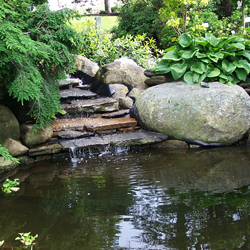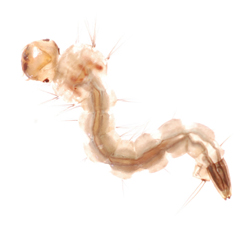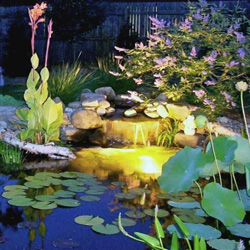Residential water features such as ponds, fountains and gazing water bowls add beauty to the garden. The reflections, sounds, and colors bring harmony and atmosphere to the setting. Unfortunately, they may also bring mosquitoes…
You probably know mosquitoes require water in their life cycle. Do you know a mosquito may mature from egg to adult in just five days in the warmth of summer? This could be happening in your water feature.
If your feature is chlorinated and filtered, such as a swimming pool, there should be no mosquito larvae. Check your animal watering troughs, reflecting ponds and slow moving streams. If you see wiggling small “worms” at the surface of your water, these are probably mosquito larvae and you should eliminate them. Mosquitoes cause more human suffering and deaths than any other organism. Diseases carried by various mosquitoes in the US include:
- Dog Heartworm
- Yellow Fever
- Encephalitis including Eastern and Western Equine, St. Louis, LaCrosse
- West Nile Virus
Garden centers sell a number of products to kill mosquitoes. One of the most effective and safest larvicide for mosquitoes is the bacterium Bacillus thuringiensis israelensis. This is sold as Mosquito Dunks, Mosquito Bits and Microbe-lift as well as other products. These products act as a stomach poison to the mosquito larvae, killing them within several days of ingestion. Bti is very safe and will not harm any other beneficial insects living in the water.
What else can you do about those annoying, and perhaps deadly, mosquitoes?
Try mosquito fish. Closely related to guppies, and technically known as Gambusia affinis, an adult can eat up to 500 mosquito larvae in one day!
Introducing Mosquito fish to the Water Feature
- Before placing your new mosquito fish into your water, be sure there is no chlorine or ammonia in the water. Purchase water treatments to neutralize these.
- After neutralization, acclimatize the fish to the water temperature by floating the bag or container in the water for 20-60 minutes. Shade it if is in the direct sun or wait until evening.
- Release your fish.
Caring for Your Mosquito fish
Little care is required. In the summer, insects should be sufficient to feed your fish. In the winter, or if insects are insufficient, flaked fish food is fine as a supplemental feeding. They prefer warmer water, but will survive in the winter at water temperatures above 33⁰F.
Koi, goldfish, and mosquito fish are fine together. Is your pond stocked with catfish or other large fish? If so, you could be feeding the mosquito fish to them!




